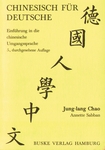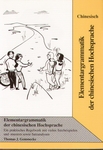Lecture Books about Chinese, Korean
My native language is German, as most of my books. But You can find books in English and other languages as well.
Chinese
|
China in East Asia plays the same predominant cultural role
as the Roman Empire in Europe - just that the Roman Empire is ancient history,
and China still exists :)
Almost all European languages use letters derived from Latin. Two major East Asian languages re-use chinese characters or created similar ones on their own: Japanese and Korean. Vietnam did use Chinese characters until the French colonization. "Chinese" is not ONE language, but a group of many Chinese dialects, that are estimated up to 100. The standard language that is taught to Westerners is Putonghua (aka "Mandarin Chinese"), spoken in Beijing. The key to all of these dialects are the characters, written all the same, but pronounced differently in any dialect. So when two Chinese meet who cannot understand a single word of the other, then they write on their hands to communicate :) But that is not applicable in Taiwan, since the Mao government simplified many characters in the area that we today call "China", whereas Taiwan (which is Chinese, too, but not as a state) kept the traditional characters that are more difficult. The never-ending conflict between China and Taiwan has a long sad story, and the two different character systems are a side effect of this. |

German - Chinese |
Buske Chinesisch für Deutsche Chao, J. + Sabban, A 1986 ISBN 3871182192 |
Ein gutes Umsteigerbook für alle, die bereits eine andere ostasiatische
Sprache lernen und sich daher schon etwas mit der Schreibweise der chinesischen Zeichen auskennen,
denn die Schreibweise wird nicht ausführlich erklärt...
Über 200 Seiten mit 62 Lektionen. Die Lesung wird stets mit angegeben. |

German - Chinese |
Schmetterling Elementargrammatik der chinesischen Hochsprache Gemmecke, T. 1993 ISBN 3926369876 |
Ein gutes Einsteigerbook für alle, die sich NICHT
mit der Schreibweise der chinesischen Zeichen auskennen und auch sonst ganz
darauf verzichten wollen ...
80 Seiten mit praktischen Grundregeln. |
Korean
|
Korea is some kind of chain link between Japan and China, although no Japanese, no Chinese
and no Korean would admit that. Maybe You need a more distant perspective to see and hear this, like
a European. I thought Korean is very near to Japanese , but my Japanese girl friend
was astonished in the first place, and eventually protested strongly :)
Well, I kept my opinion though: Japanese "daigaku" ("university") sounds very much like the Korean "dae hak" - for me a proof that the word had been imported via Korea:) Koreans write in Hangeul, that had been derived from Chinese (much like Japanese). Just that Koreans created real western-like letters from it, and the Japanese created the syllable system "Kana", in two parallel versions which are still in use today. And in South Korea, the text is a mixture of Hangeul and Chinese characters (again: much like Japanese) pronounced Korean. North Korea replaced all Chinese characters with Hangeul. |

German - Korean |
Langenscheidt Sprachführer Koreanisch 1988 ISBN 3468222009 |
Ein gutes Einsteigerbook für alle, die sich NICHT
mit der Schreibweise der koreanischen Zeichen (Hangul) auskennen und auch sonst
darauf verzichten wollen ... Hangul wird zwar kurz vorgestellt, aber es geht eben
wie in allen Sprachführern um Phrasen in Alltagssituationen und die Aussprache,
und nicht um die allgemeine Sprachlehre.
|